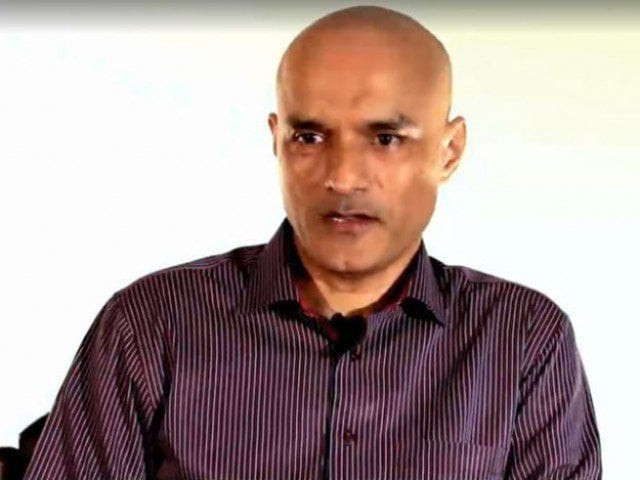Pursuing Jadhav case in IHC India's ‘best shot'
New Delhi has yet to respond to legal remedy and offer to grant second consular access to spy

Senior lawyers have observed that accepting Islamabad’s invitation to pursue the case of Indian spy Kulbhushan Jadhav in the Islamabad High Court (IHC) is the best legal option at the disposal of New Delhi, which has yet to clarify if it would go down this road or not as the deadline to file a plea challenging his death sentence by a military court is set expire on July 20.
Despite the shortage of time, India has yet to clarify its position on pursuing the case in the IHC despite assurances by Pakistani authorities that they would fully facilitate New Delhi in the process. Similarly, India has also not responded to Pakistan's offer to grant consular access to Jadhav for the second time.
Sources said the Foreign Office’s correspondence with the Indian mission in Pakistan was under way on the matter but New Delhi was reluctant to give a clear answer.
"India is busy in defaming Pakistan rather than saving the life of Kulbhushan Jadhav,” an official told The Express Tribune. However, the official added that Pakistan had also evolved a strategy to counter the Indian propaganda.
Jadhav, a serving commander in the Indian Navy and working for India’s Research and Analysis Wing (RAW), was arrested on March 3, 2016, in Balochistan on charges of espionage, and condemned to death by a military court the following year.
In view of the ICJ judgment in July last year, the federal government had promulgated the International Court of Justice (Review and Reconsideration) Ordinance, 2020 on May 20 for an effective review of the case.
The ordinance read that a foreign national -- either themselves or through their authorised representative or through a consular officer of mission of their country -- might file a petition before a high court for a review and reconsideration in terms of Section 3 of an order of conviction/sentence of a military court operating under the Army Act 1952.
It is also stated that the petition for review and reconsideration could be filed within 60 days of the promulgation of the ordinance.
The ordinance further read that in deciding the petition, the court would examine whether any prejudice had been caused to the foreign national in respect of their right to defence, evidence and principles of fair trial due to the denial of consular access according to Vienna Convention on Consular Relations of April 24 1963.
If any difficulty arises in giving effect to any provision of the ordinance, the president may pass an order as may appear to him to be necessary for the purpose of removing it.
International Dispute Unit chief Ahmad Irfan told reporters that Jadhav was informed about the promulgation of ordinance and his legal right for a review or reconsideration of the military court verdict against him in line with the ICJ judgment. However, he refused to avail the legal remedy and requested considering his mercy plea, which was already pending before the Pakistan army chief.
Pakistan then invited to India to avail the legal remedy until July 20.
Senior lawyers have advised India to pursue the case in the IHC as Pakistani courts are fully independent and would ensure the due process of the convict. The Peshawar High Court (PHC) has annulled military courts' decisions to award death sentence to militants in the recent past. Likewise, if India has any concerns regarding the new legislation, it could raise the matter before the high court.
Renowned lawyer Ahmer Bilal Sufi believes that India has three options for a review: make use of provisions of special ordinance and approach the high court, invoke Section 84 of the CPC that entitles a foreign state to become a party before courts in Lahore by filing a writ petition for a review of process; or approach a civil court of Pakistan under the CPC.
Sufi said by enacting the legislation, Pakistan had discharged its obligations under the statute of the ICJ as a responsible state, adding that Jadhav personally also had individual remedies: under the ordinance, before civil court or a high court as an alien enemy under Section 83 CPC, or through a mercy petition.
Last year, the ICJ had asked Pakistan for an "effective review and reconsideration of the conviction and sentence of Jadhav” so as to ensure that full weight was given to the effect of the violation of the rights set forth in Article 36, Paragraph 1, of the Vienna Convention and guarantee that the violation and the possible prejudice caused by the violation were fully examined.
The international court had also maintained a stay on the execution of Jadhav till "effective review".
The ICJ in its verdict had pointed out that respect for the principles of a fair trial was of cardinal importance in any review and reconsideration, and that, in the circumstances of the present case, it was essential for the review and reconsideration of the conviction and sentence of Jadhav to be effective.
The ICJ considered that the violation of the rights set forth in Article 36, Paragraph 1, of the Vienna Convention, and its implications for the principles of a fair trial, should be fully examined and properly addressed during the review and reconsideration process. In particular, any potential prejudice and the implications for the evidence and the right to defence of the accused should receive close scrutiny during the review and reconsideration, it added.
The ICJ noted that according to Pakistan, the high courts of Pakistan could exercise review jurisdiction. The court observed, however, that Article 199, Paragraph 3, of the Constitution of Pakistan had been interpreted by the Supreme Court as limiting the availability of such a review for a person who was subject to any law relating to the armed forces of Pakistan, including the Pakistan Army Act of 1952.
The Supreme Court and the high courts might exercise judicial review over a decision of the field general court martial on "the grounds of coram non judice, without jurisdiction or suffering from mala fides, including malice in law only" (Said Zaman Khan et al vs Federation of Pakistan, Supreme Court of Pakistan, Civil Petition No 842 of 2016, 29 August 2016, Para 73). Article 8, Paragraph 1, of the Constitution provided that any law which was inconsistent with fundamental rights guaranteed under the constitution was void, but this provision does not apply to the Pakistan Army Act of 1952 by virtue of a constitutional amendment (ibid, Para 125).
However, the ICJ noted that it was not clear whether a judicial review of a decision of a military court was available on the ground that there had been a violation of the rights set forth in Article 36, Paragraph 1, of the Vienna Convention.
The ICJ also referred to the Peshawar High Court's last year verdict, wherein it was held that the high court had the legal mandate positively to interfere with decisions of military courts if the case of the prosecution was based, firstly, on no evidence, secondly, insufficient evidence, thirdly, absence of jurisdiction, finally malice of facts and law. The government of Pakistan had appealed the decision and the case was still pending at the close of the oral proceedings in the present case.


















COMMENTS
Comments are moderated and generally will be posted if they are on-topic and not abusive.
For more information, please see our Comments FAQ